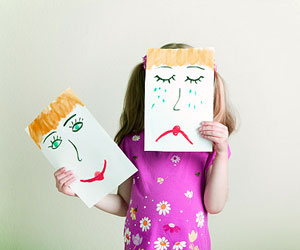“Tears of Joy” May Help Us Maintain Emotional Balance
Many life experiences, such as witnessing the birth of a child or finally achieving a long sought-after goal, can lead to what may seem like confusing expressions of emotion, like tears of joy. But new research suggests that these incongruous expressions may serve a fundamental purpose, helping us to maintain emotional balance.
The findings are forthcoming in Psychological Science, a journal of the Association for Psychological Science.
 “People may be restoring emotional equilibrium with these expressions,” said psychological scientist and lead researchers Oriana Aragon of Yale University. “They seem to take place when people are overwhelmed with strong positive emotions, and people who do this seem to recover better from those strong emotions.”
“People may be restoring emotional equilibrium with these expressions,” said psychological scientist and lead researchers Oriana Aragon of Yale University. “They seem to take place when people are overwhelmed with strong positive emotions, and people who do this seem to recover better from those strong emotions.”
There are many examples of responding to a positive experience with a negative emotion. Take, for example, the emotional expressions people show in response to adorable babies – at the same time that adults coo at babies and swaddle them, they also can’t resist pinching, squeezing, and even playfully nipping or growling at them.
Surely people don’t intend actual harm to the babies with these aggressive behaviors — so why do they do it? Aragon and her colleagues at Yale designed several experiments to find out.
Data from an online survey of adults suggest that dimorphous expressions — two different expressions that have the same origin — aren’t situation-specific; rather, they seem to emerge in response to various kinds of positive emotions.
So, people who show dimorphous expressions in response to cute stimuli, like babies, tend to show them in response to other positive situations and emotions, such as crying during happy moments in movies. This suggests that dimorphous expressions may serve as a general mechanism of expression that helps to regulate positive emotion.
As part of the study, the researchers asked participants to look at and evaluate photos of different babies, some of whom appeared more infantile (i.e., rounder faces, bigger eyes) than others.
Participants showed higher expressions of care for the more infantile babies, saying that they wanted to take care of them and protect them. But they also reported higher expressions of aggression in response to these babies, saying that they wanted to pinch the babies’ cheeks and “eat them up.”
Another online study with 679 participants confirmed these findings, and revealed that participants were more likely to report feeling overwhelmed with very strong positive feelings in response to the more infantile babies.
Importantly, the data indicated that it was specifically this feeling of being overwhelmed by positive emotion that elicited the aggressive responses. People who showed higher expressions of aggression while looking at the babies tended to show a bigger drop-off in positive emotion five minutes after viewing the images, suggesting that the negative emotions helped them moderate their intense positive emotions, bringing them back to emotional equilibrium
These new discoveries begin to explain common things that many people do but don’t even understand themselves, Aragon said.
“These insights advance our understanding of how people express and control their emotions, which is importantly related to mental and physical health, the quality of relationships with others, and even how well people work together,” she said.
Study co-authors include Margaret S. Clark, Rebecca L. Dyer and John A. Bargh of Yale.




APS regularly opens certain online articles for discussion on our website. Effective February 2021, you must be a logged-in APS member to post comments. By posting a comment, you agree to our Community Guidelines and the display of your profile information, including your name and affiliation. Any opinions, findings, conclusions, or recommendations present in article comments are those of the writers and do not necessarily reflect the views of APS or the article’s author. For more information, please see our Community Guidelines.
Please login with your APS account to comment.